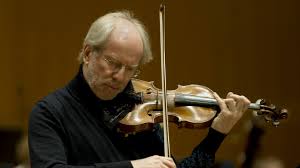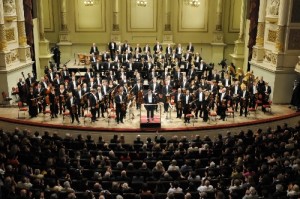WHO IS GOING TO TELL GIDON KREMER NOT TO RETIRE TOO SOON?
WHO IS GOING TO TELL GIDON KREMER NOT TO RETIRE TOO SOON?
(Gidon Kremer)
Chetana Nagavajara
BERLIN , 7 September 2014
I was being rude and perhaps unfair in my previous review of September 3, 2014 on the Brahms Marathon that in my opinion turned out badly. (I have listened to the sound recording available on the Kulturradio and have to confirm my first impression.) I still feel a sense of guilt that when Gidon Kremer came to Bangkok over a decade ago, there were about 200 people in the audience in the main hall of the Thailand Cultural Centre. Was it because he was playing an unknown composition, Philipp Glass’s Violin Concerto? Hearing him in Berlin on September 5, 2014 with the Saechsische Staatskapelle Dresden under Christian Thielemamm, I knew for sure that I could not assess him in the same way that I did the other day with Daniel Barenboim. Kremer came extremely well prepared and gave the audience a rare musical, and spiritual, experience of the violin concerto under the title “In tempus praesens” by the Tatarian composer, SOFIA GUBAIDULINA. The work was written for Anne Sophie Mutter, who premiered it in 2007 at the Lucerne Festival. If Kremer could still play like that, he would perhaps rival Pablo Casals in performing longevity. Now 67 years old, only 5 years younger than Barenboim, Kremer will probably last longer as a performing artist. So we should appeal to him: “Don’t retire too soon.”
(Christian Thielemann and the Saechsische Staatskapelle Dresden)
If you know Shostakovich (and most recently the Pro Musica of Bangkok gave you a chance to hear something very profound) and how he struggled to bring out those great works in spite of the oppressive Communist Regime, you will appreciate how Gubaidulina survived those hard times. The simple fact is often forgotten: you can put a human being physically in chain, but you cannot imprison human spirit and human creativity. (The great modern German poet, Paul Celan, has said this so convincingly, and I have already quoted him several times.) So is it with Shotakovich and with Gubaidulina. Let us not forget that this violin piece was written long after those painful events. But as Wordsworth puts it: poetry is “emotion recollected in tranquillity”. I do not think that by calling her work “In time present” (sounding almost like a line from T.S. Eliot) she has totally divorced herself from the past. The past has been transcended by self-clarification, self-purification and new awakening. There is a serenity underlying this work, although the surface may be rough at times, but it is never crude. This fits Kremer’s playing very well: he is not a master of extremes (as befitting a pupil of the great David Oistrakh). The composer wants to concentrate on the present, make it livable, and the soloist must obey her.
(Sofia Gubaidulina)
The very first phrase is played with a “glissando”, a question mark, so to speak. The solo violin does not have to wait long: the answer comes immediately from the chiming of a strange-looking percussive instrument at the back of the orchestra, a set of multi-tier cymbals of various sizes forming the shape of a pagoda. I always reserve a seat behind the orchestra in order to observe the conductor, and this time from my vantage point, I could see the entire orchestra perform. The link between the king of western instruments (the violin) and the sight and sound of Oriental inwardness is certainly of great significance. The solo instrument is never let alone; it is never lonely; it poses further questions to individual instruments and groups of instruments – one by one. A series of DIALOGUE has been launched, and it was a joy for me to hear the orchestra and to SEE it at the same time. Mind you, the soloist never asks the same question, he varies his questions according to his conversation partners, and since this is meant to be a violin concerto, each question is formulated via violinistic and virtuosic character that is fiendishly difficult. No need to worry, Gidon Kremer has done his homework well. To give prominence to the soloist who is caught in this big community of instrumentalists known as a symphony orchestra, with very many percussive instruments, some of which I have never seen before like the pagoga of cymbals, the composer makes the soloist play mostly in the high register. Even when he plays on the G string, he has to move up at least to the fifth position. Furthermore she takes away the violins from the orchestra altogether, and lets the violas for once fill a key position. At one point the conversation takes the form of a string trio with one violin, one first viola and one second viola. There is therefore no problem of balance. The presence of lower strings can be used to convey certain meanings, which the Soviet pundits might not have liked! Of course, the instrumental groups are allowed to converse with each other, their conversation starting off like a murmuring that soon develops into a threatening noice : a people’s revolution is afoot. The violin does not want it to go that far; it intervenes and the concerto rounds off into a peaceful ending.
The present is tolerable on the condition that it rests on HUMAN COMPANIONSHIP. A violin concerto can convey a message like that? Paganini would have been at a loss. One thing must be emphasized : the soloist must not take it as a virtuoso piece to exhibit his violinistic prowess, and the orchestra has to be supportive as well as precise. Who said Christian Thielemann is not good at contempoary music? 20 years ago, maybe. The way he conducted the Staatskapelle Dresden on September 5, 2014 rather proves that he excels in it.
Talking about Christian Thielemann, people not familiar with the Berlin musical world may not know that he relinquished the directorship of the Deutsche Oper (formerly West Berlin’s only opera house) in 2002, because the budget of his opera house had been cut in order to give the “other” house, the Staatsoper (directed by Daniel Barenboim), more money. He has come back to conduct the Berlin Philharmonic occasionally. But I surmise the two factions still don’t see eye to eye, and there has been mud-slinging directed against Thielemann. For the concert on September 5, the Philarmonie was NOT full. I am sure the Staatskapelle Dresden would attract a full house in New York or Tokyo any time.
Thielemann knew the Berlin audience. A modern composition, however great and however well played, could not have proved the stature of his orchestra with a long tradition (along with the Gewandhaus of Leipzig). He rightly chose the unfinished 3-movement Symphony No. 9 of Anton Bruckner for the second half of the concert. This is the symphony that Bruckner dedicated to God himself. One would have expected a performance marked by extremes, grandiose and pompous. Nothing of the sort! Thielemann must have taken the hint from the Violin Concerto by Gubaidulina that it is good enough to stay on this side of the line without trying too hard to cross over into transcendence. The interpretation was this-worldly, full of human warmth. A misinterpretation? I am no expert to judge. I guess Thielemann must have matured over the years and has discovered that sobriety does not necessarily preclude deeply felt emotion. He has been critical of those ubiquitous colleagues who can never stay in one place for long. He is prepared to devote his time to the Staatskapelle Dresden as its permanent and resident conductor. In this respect, I must not be misunderstood. I experienced many memorable opera performanes conducted by him when still in his late thirties and early forties at the Deutsche Oper in the Bismarckstrasse – Wagner, Poulenc and above all Richard Strauss: “Die Frau ohne Schatten” almost literally caught fire!
Just one last techical issue having to do with the mammoth PHILHARMONIE. Karajan was intent on honing his Berlin Phil to fill the gigantic space, hence the Berlin sound, that has now been captured via the Digital Concert Hall, regardless of who is conducting. A musician and composor colleague from Hong Kong who knows Berlin very well has advised me to observe how a visiting orchestra has to struggle with the acoustics of the Philharmonie. Thielemann knew the hall well but did not want to overdrive his musicians. Let’s be frank about it: the visiting orchestra could have done with 20 more strings.
On the whole, the evening was a very absorbing musical experience for me. As for Gidon Kremer, I wish he could keep on playing the violin for many, many years to come. That he does not want to come to Bangkok again is understandable. We don’t deserve it.



M. Argerich was born in 1941 and debut in 1965.